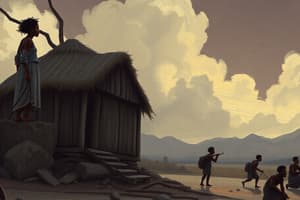Podcast
Questions and Answers
What is the main obstacle for true Negro art in America, according to the text?
What is the main obstacle for true Negro art in America, according to the text?
What does the young poet's desire to 'be a poet—not a Negro poet' indicate?
What does the young poet's desire to 'be a poet—not a Negro poet' indicate?
What is the occupation of the young poet's father?
What is the occupation of the young poet's father?
What does the phrase 'Don’t be like niggers' reveal about the mother's attitude?
What does the phrase 'Don’t be like niggers' reveal about the mother's attitude?
'Look how well a white man does things.' What does this phrase suggest about the father's mindset?
'Look how well a white man does things.' What does this phrase suggest about the father's mindset?
Who is considered the 'Dean of African American painters'?
Who is considered the 'Dean of African American painters'?
Who became the first widely recognized serious African American actor in the early 1920s?
Who became the first widely recognized serious African American actor in the early 1920s?
Which work is considered one of the most stylistically sophisticated works of the Harlem Renaissance?
Which work is considered one of the most stylistically sophisticated works of the Harlem Renaissance?
Who was encouraged by Winold Reiss to incorporate African motifs into his art?
Who was encouraged by Winold Reiss to incorporate African motifs into his art?
Who is considered the 'Empress of the Blues'?
Who is considered the 'Empress of the Blues'?
What is the impact of the concept of 'white' on children in the colored middle class?
What is the impact of the concept of 'white' on children in the colored middle class?
What is the attitude of the 'better-class Negroes' towards black artists?
What is the attitude of the 'better-class Negroes' towards black artists?
Why do common people provide a wealth of material for artists?
Why do common people provide a wealth of material for artists?
What challenges do black artists face in America?
What challenges do black artists face in America?
How did Charles Gilpin gain recognition as an actor?
How did Charles Gilpin gain recognition as an actor?
Who faced opposition from both colored and white people for the work 'Cane'?
Who faced opposition from both colored and white people for the work 'Cane'?
Which artist was known for incorporating vaudeville and comedy routines into her shows?
Which artist was known for incorporating vaudeville and comedy routines into her shows?
Who was a popular Spanish singer and actress?
Who was a popular Spanish singer and actress?
Who adhered to European traditions of form and meter in his poems?
Who adhered to European traditions of form and meter in his poems?
Who was known for their racial themes in poetry and inspiration from jazz?
Who was known for their racial themes in poetry and inspiration from jazz?
Flashcards are hidden until you start studying
Study Notes
The Struggle of the Negro Artist
- The Negro artist faces criticism and misunderstanding from both their own community and unintentional pressure from white individuals.
- Jean Toomer faced opposition from both colored and white people for his work "Cane," despite its praise from critics.
- The author anticipates the rise of the Negro theater and the emergence of a school of colored artists, as well as the growth of Negro dancers and singers.
- The author's poems are often racial in theme and treatment, drawing inspiration from jazz and the expressions of Negro life in America.
- The Philadelphia clubwoman is ashamed of her race's creations and dislikes the portrayal of anything distinctly racial, reflecting a subconscious "white is best" mentality.
- The younger Negro artist is urged to use their art to combat the aspiration to be white and instead embrace their own racial identity.
- The author criticizes the black poet who wants to be recognized as a poet, not a Negro poet, and the colored artist who avoids painting Negro faces due to fear of their un-whiteness.
- The author urges the near-intellectuals to embrace and understand Negro jazz, literature, and art, and encourages them to appreciate their own beauty.
- The younger Negro artists aim to express their individual dark-skinned selves without fear or shame, regardless of the opinions of white or colored people.
- The text includes references to Countee Cullen, Raquel Meller, Clara Smith, Charles Waddell Chestnutt, and Paul Laurence Dunbar.
- Countee Cullen was a classically trained African American writer who adhered to European traditions of form and meter in his poems.
- Raquel Meller was a popular Spanish singer and actress, while Clara Smith was an African American blues singer known for incorporating vaudeville and comedy routines into her shows.
Studying That Suits You
Use AI to generate personalized quizzes and flashcards to suit your learning preferences.




